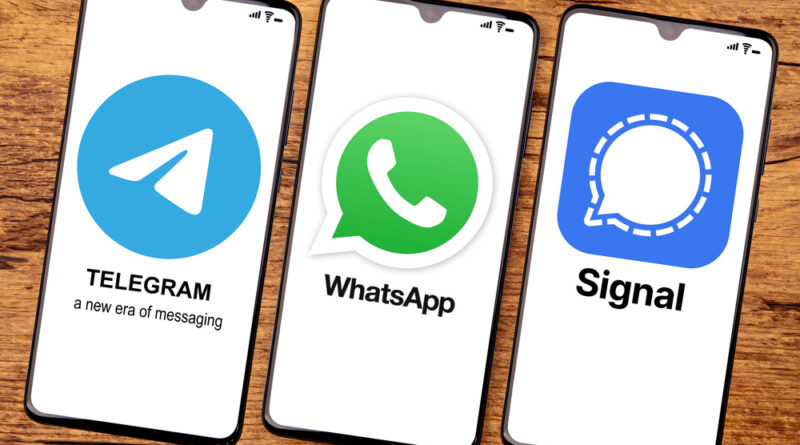Encrypted Messaging Showdown: Signal, Telegram, or WhatsApp—Which App Best Protects Your Privacy?
As governments, businesses, and everyday users navigate cybersecurity threats, the debate over which encrypted messaging app offers the best protection continues to heat up. With encrypted apps touted as the solution to ensuring secure communications, the reality is more complicated, particularly when these tools are mistakenly used to transmit sensitive or government-related data.
Recent headlines highlight the risks: top government officials have faced criticism for using encrypted messaging apps to discuss classified topics, underscoring that no matter how robust an app’s security features may be, these platforms are not designed for transmitting official documents or operational details. Beyond this misuse, consumers and professionals alike are left with a choice among popular encrypted messaging apps—Signal, Telegram, and WhatsApp.
Signal: The Gold Standard in Privacy
Among its competitors, Signal is generally recognized as the best option for privacy-conscious users. Built around a strict policy of minimal data collection, Signal only requires a user’s phone number to function. This lean approach to data means that even if pressured by law enforcement, the app can offer very little user information beyond basic connection dates. Open-source development adds an additional layer of trust; its publicly accessible code allows independent experts to scrutinize the app’s security practices and confirm that it lives up to its privacy promises.
Funded by a nonprofit organization rather than driven by ad revenue or monetization of user data, Signal has maintained a sharp focus on protecting its users. It continuously employs advanced cryptographic techniques, such as forward secrecy, where each message is encrypted with a different key. This means that even if one message were compromised, it wouldn’t lead to a broader security breach. While ideal for private conversations, users are cautioned against employing Signal—or any encrypted messaging app—for discussing sensitive government operations.
Telegram: A Hybrid Model with Caveats
Telegram offers a unique blend of features that merge the functionality of traditional messaging apps with those of community-based social platforms. As a cloud-based service, Telegram stores data on its servers, which facilitates cross-platform messaging and allows users to access messages on devices including desktops and browsers. However, this convenience comes at a cost. Only the app’s secret chats—an optional feature—are secured with end-to-end encryption, while regular chats and public channels are encrypted in transit but can be accessed by Telegram once stored on their servers.
Telegram has faced its share of controversies, including notable data breaches that have compromised user information in the past. The app has also updated its privacy policies to allow for the release of certain data to law enforcement when legally required. Nevertheless, for users looking for a platform that combines group chat functionalities with secure messaging, Telegram remains a popular alternative, provided one makes a conscious decision to use its secret chat mode for more sensitive conversations.
WhatsApp: Ubiquity Meets Inconsistent Privacy
WhatsApp is the world’s most widely used encrypted messaging app, boasting roughly two billion monthly users. Leveraging the same encryption protocol as Signal, WhatsApp does ensure that messages are unreadable to anyone other than the intended recipient—provided both parties are using the app. However, the sheer scale of WhatsApp’s user base and its affiliation with Meta have raised significant concerns regarding data collection. The app gathers extensive user information, including usage patterns, device details, and even data shared by users’ contacts.
This broad data harvesting means that while your individual messages remain encrypted, WhatsApp builds a comprehensive profile based on user behavior that can be used for targeted advertising and other commercial purposes. In an environment where even a small breach can have significant repercussions, many privacy advocates advise opting for platforms like Signal that prioritize minimal data retention over wide-reaching data aggregation practices.
Balancing Convenience and Security
Each of the three major apps discussed has its own strengths and weaknesses. Signal leads the pack for those whose priority is absolute privacy and minimal data collection. Telegram offers a compelling package for users who value versatility and community features, though its default settings do not enforce end-to-end encryption on all conversations. WhatsApp’s popularity makes it a go-to for everyday communications, but users need to be aware that convenience and ubiquity often come at the price of higher data collection.
For government officials and any users handling sensitive information, reliance on encrypted messaging apps remains a risky proposition. While secure messaging can be a powerful tool against state-sponsored espionage and other digital threats, it is paramount to remember that these apps are designed for personal communication rather than the transmission of classified documents or operational details.
In a landscape marked by constant cyber threats, the choice of a messaging app comes down to the individual’s priorities. For the privacy purist, Signal is hard to beat; for the digitally social, Telegram presents an attractive alternative; and for everyday convenience, WhatsApp continues to dominate the market. As technology evolves, users must remain vigilant—understanding that even the best encrypted apps are not a substitute for robust overall security protocols, especially in high-stakes government or corporate environments.
Photo Credit: DepositPhotos.com

